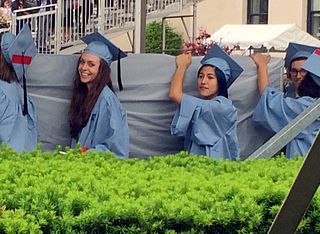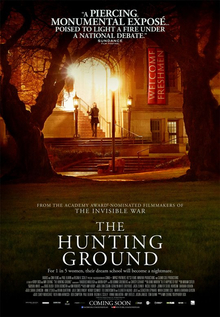Related Research Articles

Title IX is a landmark federal civil rights law in the United States that was enacted as part of the Education Amendments of 1972. It prohibits sex-based discrimination in any school or any other education program that receives funding from the federal government. This is Public Law No. 92‑318, 86 Stat. 235, codified at 20 U.S.C. §§ 1681–1688.
The Office for Civil Rights (OCR) is a sub-agency of the U.S. Department of Education that is primarily focused on enforcing civil rights laws prohibiting schools from engaging in discrimination on the basis of race, color, national origin, sex, disability, age, or membership in patriotic youth organizations.
The anti-rape movement is a sociopolitical movement which is part of the movement seeking to combat violence against and the abuse of women.

Susan Herbst is an American political scientist and academic administrator who served as the 15th president of the University of Connecticut. She was named president on December 20, 2010, and took office on June 1, 2011. She succeeded Michael J. Hogan and was the first woman to be selected as the University of Connecticut's president since the school's founding in 1881. In August of 2019, Herbst was succeeded by Thomas C. Katsouleas.
Campus sexual assault is the sexual assault, including rape, of a student while attending an institution of higher learning, such as a college or university. The victims of such assaults are more likely to be female, but any gender can be victimized. Estimates of sexual assault, which vary based on definitions and methodology, generally find that somewhere between 19–27% of college women and 6–8% of college men are sexually assaulted during their time in college.
Andrea Lynn Pino (born February 15, 1992) is an American women's rights and civil rights activist, author, and a public scholar on issues of global gender based violence, media framing of violence, gender and sexuality, and narratives of survivorhood. She is the queer daughter of Cuban refugees and has stated that she is a survivor of sexual assault.
Angie Epifano, a former student at Amherst College, gained widespread media attention and millions of page views after she wrote an essay on her personal experience of sexual assault that was published in the Amherst student newspaper, The Amherst Student. After the publication of her essay, Amherst College began investigating its sexual assault procedures, and women from other college campuses in the United States came forward to file federal complaints under Title IX and to form groups to reduce sexual assault on college campuses.
The Campus Accountability and Safety Act (CASA) was a bill introduced in the 114th United States Congress with the goal of reducing sexual violence on college and university campuses. First introduced in 2014, a revised bill was introduced in February 2015 by Senator Claire McCaskill of Missouri with nine bi-partisan cosponsors. 43 cosponsors eventually signed on. The bill died in committee at the end of the session without reaching a floor vote in either house.
In April 2013, Occidental College was one of the first in a series of US higher education institutions to be accused of failing to take campus sex crimes seriously by improperly reporting and adjudicating sexual assaults and covering up rapes. Occidental students and faculty filed two federal complaints against the College, alleging violations of Title IX of the US Education Amendments of 1972 and the Clery Act.

Mattress Performance (Carry That Weight) (2014–2015) was a work of endurance/performance art which Emma Sulkowicz conducted as a senior thesis during the final year of a visual arts degree at Columbia University in New York City.

The Hunting Ground is a 2015 American documentary film about the incidence of sexual assault on college campuses in the United States and the reported failure of college administrations to deal with it adequately. Written and directed by Kirby Dick and produced by Amy Ziering, it premiered at the 2015 Sundance Film Festival. The film was released on February 27, 2015, an edited version aired on CNN on November 22, 2015, and was released on DVD the week of December 1, 2015. It was released on Netflix in March 2016. Lady Gaga recorded an original song, "Til It Happens to You," for the film, which was nominated for the Academy Award for Best Original Song.
Know Your IX is an American political advocacy group founded in 2013. It aims to inform students of their right to an education free from gender-based violence under Title IX of the Education Amendments of 1972, which prohibits sex discrimination in institutions receiving federal government funding. The organization also seeks to influence legislation and policy to improve federal enforcement of Title IX and treatment of student victims.
Families Advocating for Campus Equality (FACE) is an American advocacy group whose stated goal is to ensure fairness and due process for all parties involved in allegations of sexual misconduct on college and university campuses. FACE was started by Sherry Warner Seefeld and two other mothers who say their sons were falsely accused of sexual misconduct on their college campuses.
In April 2013, Emma Sulkowicz, an American fourth-year visual arts major at Columbia University in New York City, filed a complaint with Columbia University requesting expulsion of fellow fourth-year student and German national, Paul Nungesser, alleging he had raped Sulkowicz in her dorm room on August 27, 2012. Nungesser was found not responsible by a university inquiry.

The Baylor University sexual assault scandal was the result of numerous allegations of and convictions for sexual and non-sexual assaults committed by Baylor University students, mostly players on the Baylor Bears football team. During a period from about 2012 to 2016, school officials suppressed reports of rapes and sexual misconduct. In 2016, Baylor's football team came under fire when it was revealed university officials had failed to take action regarding the alleged rapes and assaults. The scandal led to the ousting of head football coach Art Briles, the demotion and eventual resignation of Baylor president Ken Starr, the resignation of athletic director Ian McCaw, and the firing of two others connected with the football program. It also led to the resignation of Baylor's Title IX Coordinator, Patty Crawford. A plaintiff's attorney, Jim Dunnam, accused Baylor of implementing a ″concerted strategy to get the public to believe this is entirely and only a football-related problem."
After a sexual assault or rape, victims are often subjected to scrutiny and, in some cases, mistreatment. Victims undergo medical examinations and are interviewed by police. If there is a criminal trial, victims suffer a loss of privacy, and their credibility may be challenged. Victims may also become the target of slut-shaming, abuse, social stigmatization, sexual slurs and cyberbullying. These factors, contributing to a rape culture, are among some of the reasons that may contribute up to 80% of all rapes going unreported in the U.S, according to a 2016 study done by the U.S. Department of Justice.
Candice Erin Jackson is an American lawyer and former government official from California. She served in the Trump administration as the Deputy Assistant Secretary for Strategic Operations and Outreach in the Office for Civil Rights (OCR) of the U.S. Department of Education, and the Office's Acting Assistant Secretary from April 2017 to July 2018. From July 2018 to January 2021, she served as the Deputy General Counsel of the Department of Education.
Stop Sexual Assault in Schools is a United States non-profit organization that advocates for K–12 students’ right to an education free from sexual harassment and sexual assault. Sexual assault and severe or pervasive sexual harassment are types of sex discrimination prohibited under Title IX of the Education Amendments of 1972, a civil rights law that prohibits sex discrimination in any education program that receives federal funding. SSAIS accomplishes its mission by creating and distributing free education programs, filing pro bono civil rights complaints with the Office for Civil Rights (OCR), collaborating with national gender equity organizations, supporting legislative and legal initiatives, working with communities and families to bring schools into Title IX compliance, and educating the media about how sexual harassment and sexual violence in K–12 schools can violate students’ rights.
Sofie Karasek is an American advocate for women's rights and the fight against sexual assault. In 2013, she helped launch a national movement to hold universities accountable for sweeping sexual harm under the rug under Title IX, and was a key driver behind California's "Yes Means Yes" law. She co-founded the advocacy organization called End Rape on Campus (EROC) in 2013.
Wendy Murphy is a lawyer specializing in child abuse and interpersonal violence.
References
- ↑ Vivian Kuo and Michael Pearson, "U.S. to investigate UNC's handling of sex assault reports", CNN, 8 March 2013, accessed 4 April 2016
- 1 2 3 4 Annie E. Clark (2013-01-13). "Why I am Filing an Office for Civil Rights Complaint and Clery Act Complaint Against UNC-Chapel Hill". Huffington Post. Retrieved 2013-05-05.
- ↑ Sneed, Tierney (February 27, 2015). "'The Hunting Ground' Subjects Defend Title IX Campaign". U. S. News & World Report.
- ↑ Johnson, Rebecca (October 9, 2014). "Campus Sexual Assault: Annie E. Clark and Andrea Pino Are Fighting Back—And Shaping the National Debate". Vogue.
- ↑ "Student-led activists movement fights to end rape on campus - CNN.com". CNN. 9 February 2014. Retrieved 2015-11-05.
- ↑ "Annie E. Clark presents at the United Nations Commission on the Status of Women". WomenNC. Archived from the original on 2013-07-03. Retrieved 2014-03-06.
- ↑ "Campus Sexual Assault: Annie E. Clark and Andrea Pino Are Fighting Back—And Shaping the National Debate". Vogue. 9 October 2014. Retrieved 2015-11-05.
- ↑ Tyler Kingkade (2013-01-16). "University Of North Carolina Routinely Violates Sexual Assault Survivor Rights, Students Claim". Huffington Post. Retrieved 2013-05-04.
- ↑ Alexander Abad-Santos (2013-03-26). "Apparently UNC Thinks 'Rape Is Like Football'". The Atlantic Wire. Retrieved 2013-05-05.
- ↑ Tyler Kingkade (2013-03-21). "College Sexual Assault Survivors Form Underground Network To Reform Campus Policies". Huffington Post. Retrieved 2013-05-05.
- ↑ Richard Pérez-Peña (2013-03-20). "College Groups Connect to Fight Sexual Assault". The New York Times. Retrieved 2013-05-05.
- ↑ Richard Pérez-Peña (2013-03-07). "Students Initiate Inquiry Into Harassment Reports". The New York Times. Retrieved 2013-05-04.
- ↑ "|title= U.S. Department of Education to investigate UNC's handling of sexual assault cases |work= The Carolina Mercury". Archived from the original on 2015-11-21. Retrieved 2013-05-16.
- ↑ "Melissa Harris-Perry" (Interview). San Francisco: MSNBC. 2013-03-16. Archived from the original on April 19, 2013. Retrieved 2013-07-09.
- ↑ Stancill, Jane (June 1, 2011). "UNC-CH women wage national campaign against sexual assault". News and Observer. Retrieved 21 June 2013.
- ↑ Ginny Graves (June 2013). "Attention Rapists: You've Met Your Match". Glamour magazine. Retrieved 2013-06-22.
- ↑ Libby Sander (2013-05-23). "4 More Colleges Are Targets of Students' Complaints Over Sexual Assault". The Chronicle of Higher Education. Retrieved 2013-06-22.
- ↑ Castellanos, Dalina (22 May 2013). "Activists Accuse Colleges of Not Responding to Sexual Assault Complaints". LA Times. Retrieved 16 July 2014.
- ↑ Gillibrand, Kirsten (2015). "Resource Center: Campus Accountability and Safety Act".
- 1 2 Barnes, Brook (25 January 2015). "An Unblinking Look at Sexual Assaults on Campus". New York Times. No. 25 January 2015. Retrieved 2015-03-13.
- ↑ "2017 Amelia Bloomer List". American Library Association. 2017-01-25. Retrieved 2021-04-23.
- ↑ Johnson, Rebecca (October 9, 2014). "Campus Sexual Assault: Annie E. Clark and Andrea Pino Are Fighting Back—And Shaping the National Debate". Vogue.
- ↑ Glock, Allison. "Fighting Rape on Campus: Talking with Two Heroes from 'The Hunting Ground'". ESPN W. Retrieved 5 November 2015.